New Book Releases / Summer 2020
If you would like to alert us to a recent or forthcoming film publication for the next round-up in winter, please contact us here. For notes on more books, see David Hudson’s monthly roundup at Criterion’s The Daily.
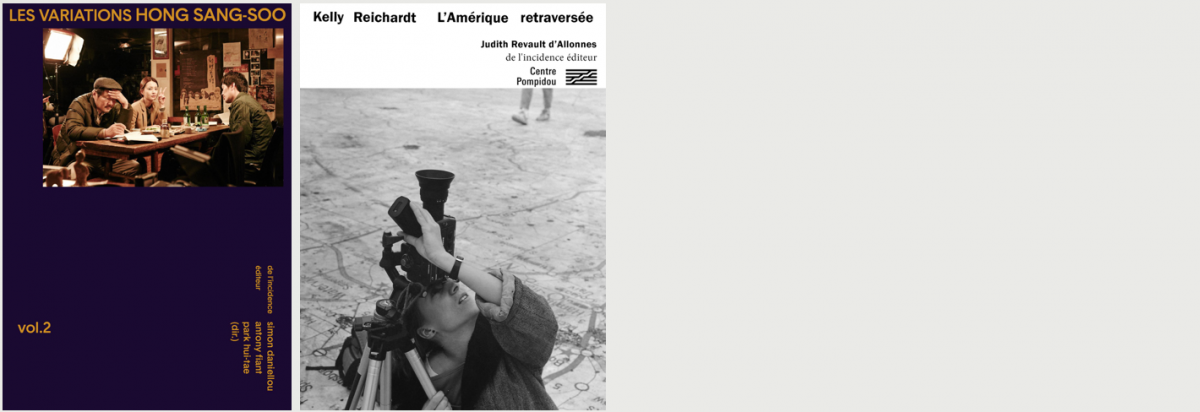
Let's start off with the regular round of new monographs on individual filmmakers. Two books we’re especially looking forward to will by published by De l’incidence éditeur in October and November, respectively. Almost three years after the first part, the long-awaited second volume of Les Variations Hong Sang-soo appears. Vol. 2 is a collection of conversations with Hong’s technicians, collaborators, actors, producers and friends, focusing on the filmmaker at work. It also contains some of Hong’s working documents that have never been published before. You’ll be able to order the publication on the website of the publisher. Originally part of the first volume, Jacques Aumont’s text ‘Idioties : une poétique du réel’ has been translated into English in Sabzian’s dossier on Hong Sang-soo, assembling for the first time a number of newly-translated essays and interviews.
With First Cow (2020) available to stream in virtual theatres since July 10, a first book in French is devoted to its filmmaker. Kelly Reichardt: L’Amérique retraversée looks at how Reichardt's work questions the constructions of American society and shifts our gaze on the country, both its present and its history, by revisiting the road movie, thriller or western. The book is composed of an essay, several interviews and numerous unpublished working documents. The book will be published in the run-up to Reichardt’s retrospective at the Centre Pompidou (January 23 – February 7, 2021). The author, Judith Revault d’Allonnes, is the film programmer there for the last twenty years and an occasional writer for Trafic and Débordements. You’ll be able to order the publication on the website of the publisher.
On July 21, the editors at Seventh Row also released a new collection, Roads to Nowhere: Kelly Reichardt’s Broken American Dreams. Along with an essay on each of her films, the book includes conversations with Reichardt herself and many of her key collaborators, such as DP Chris Blauvelt who shares previously unpublished diagrams and behind the scenes polaroids. You can find a detailed table of contents and buy the almost 400-page e-book on their website, where you can also read the foreword and the interview with actress Lily Gladstone (Certain Women, First Cow) for free.
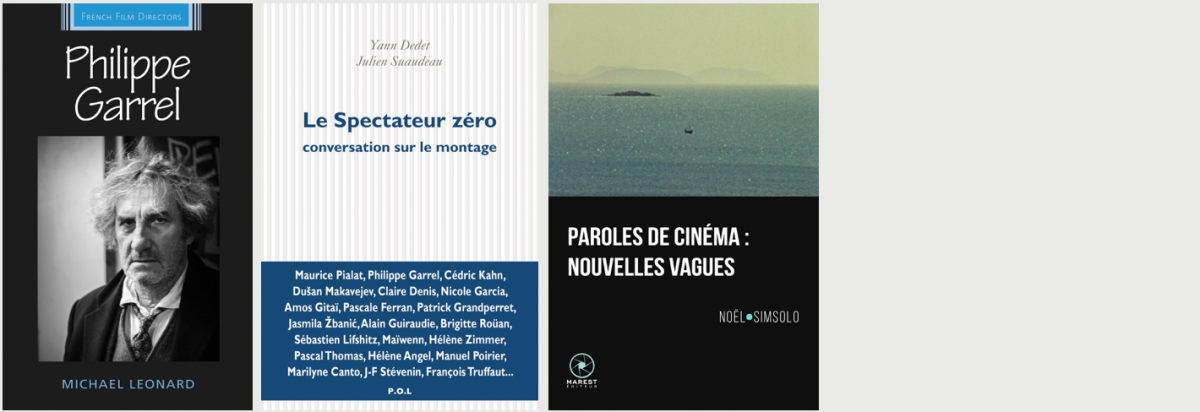
With his new film Le sel des larmes (2020) currently playing in theaters in France, a first book in English on Philippe Garrel finally materialized. Already out since January as part of Manchester University Press’s ‘French Film Directors’ series, this study observes the eclecticism of the director’s influences, looking to avant-garde movements such as the Situationists, Surrealism, Arte Povera and the American Underground, in order to explore his original body of work. Consideration is also given to Garrel’s relationship with other members of the so-called post-New Wave, including Jean Eustache and Chantal Akerman. You can find the table of contents, read the introduction, and order this (heavily priced) publication on the website of the publisher.
One of the best French editors who’s been a significant collaborator of Philippe Garrel among many other directors (François Truffaut, Maurice Pialat, Claire Denis, ...), Yann Dedet, is the co-author and subject of a new book that in the form of series of interviews chronologically traces Dedet’s 50-year career in a very concrete and detailed manner, Le Spectateur Zéro – Conversation sur le montage: Entretiens avec Julien Suaudeau. Jean-Michel Frodon had called it a worthy supplement to Montage, une anthologie (1913-2018), which we highlighted in one of our previous book notes. The description on the website of the publisher P.O.L. states: “A similar book in French about editing doesn’t exist. These interviews read as an unique document on the craft of editing and Dedet's day-to-day work.” There, you can find more information, leave through the first pages of the book, and read excerpts of the review from Positif and Cahiers du Cinéma, that dedicated eight pages to this publication in their June issue.
Philippe Garrel is also one of the many filmmakers included in Paroles de cinéma – Nouvelles Vagues, a new collection gathering 29 interviews conducted by writer and film historian Noël Simsolo between 1969 and 1985 for various magazines, some of which hadn’t been published before. Released last March, the book contains his talks with Marguerite Duras, Straub-Huillet or Fassbinder, to only name a few. In his review, the new editor-in-chief of Cahiers, Marcos Uzal, calls Simsolo an excellent interviewer because he helps filmmakers to think, goes to the essence of underlying formal, political or moral principles of the work, and asks just the right questions to push or provoke someone and disrupt repeated promo talks. On the website of publishing house Marest, you can find the full list of interviews and order the collection.
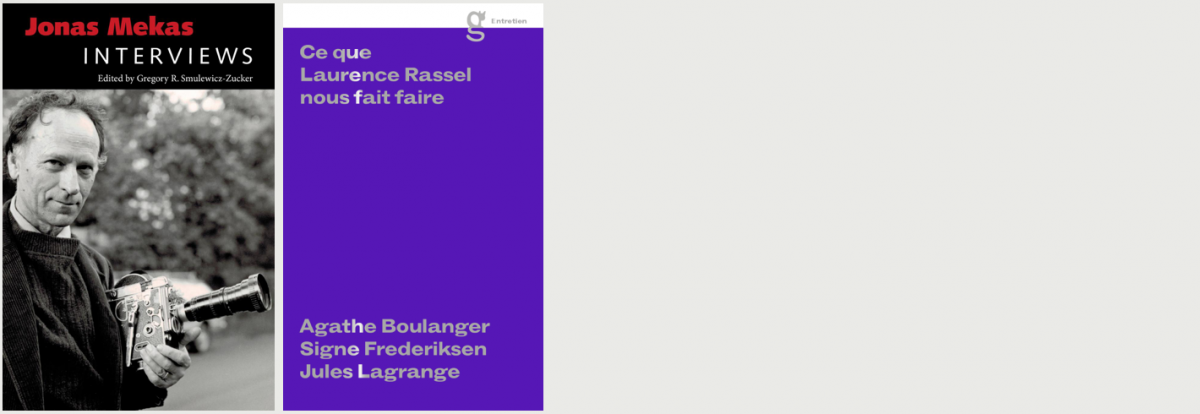
In its ‘Conversations with Filmmakers’ series, University Press of Mississippi also released multiple collections of interviews over the past couple of months. A volume on Michael Haneke (June) features seventeen articles, fourteen of which have been translated into English for the first time. The one on William Friedkin (March) gathers fifteen articles, interviews, and seminars, some previously unpublished or obscured. A Claude Chabrol collection (January) contains seventeen interviews, most of which have been translated into English for the first time. A compilation of eighteen Jonas Mekas interviews is forthcoming in August. You can access and (pre-)order the individual titles on the book series’ website.
A totally different book based on interviews, Ce que Laurence Rassel nous fait faire has been published this past May. In 2018, a group of three visual artists – Agathe Boulanger, Signe Frederiksen and Jules Lagrange – started a year-long conversation with Laurence Rassel, the director of the Brussels art school erg (école de recherche graphique). The volume explores how to promote emancipation and horizontality in schools and art institutions, how to make them more liveable, more inventive and self-critical. Although less focused on film, it includes sections such as ‘Passer d’abord par le cinéma’, or ‘La rencontre avec Chris Marker’. On the website of publisher Paraguay Press, you can download the e-book for free, or order the publication in print.
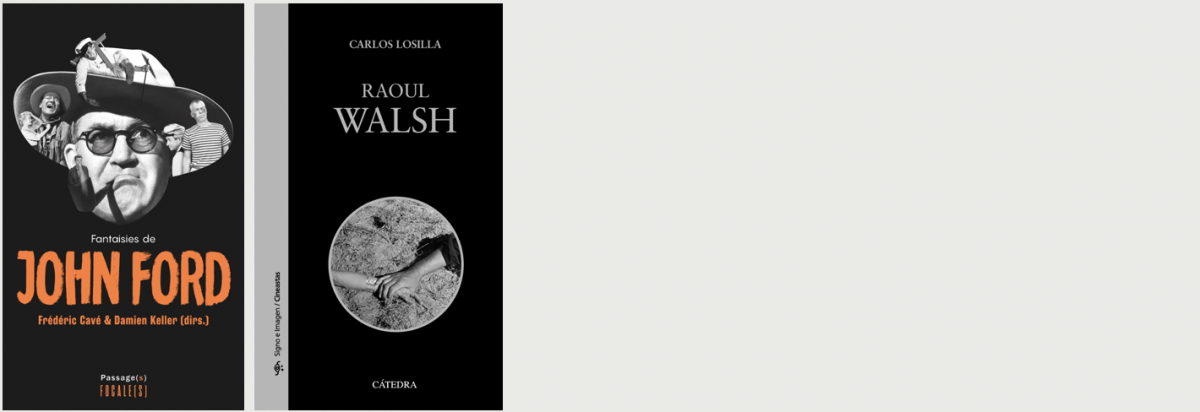
Next up are three monographs that offer new takes on three classical Hollywood directors. Fantaisies de John Ford focuses on what critic Jean-Claude Biette once called the “bons mauvais Ford”. This anthology looks into the fantastical, comical or picaresque side of a heterogeneous oeuvre too often reduced to the westerns, while Ford once lamented: “I feel I’m essentially a comedy director, but they won’t give me a comedy to do.” On the website of publisher Editions Passage(s), you can order the book and leave through it to find the table of contents, the introduction and a part of the first chapter.
Similarly, a new volume on Raoul Walsh doesn’t focus on his “classical” work such as High Sierra (1941) or White Heat (1949), but also on the lesser-known Walsh of say Going Hollywood (1933), The Man I Love (1947) or The Revolt of Mamie Stover (1947). Walsh directed his first film in 1914 well into the silent era and ended his career fifty years and 137 films later with A Distant Trumpet (1964). We’ve included this Spanish-language volume because it's written by film critic and professor Carlos Losilla. Forgoing a chronological or linear itinerary, Carlos Balbuena wrote, Lossila deals with Walsh’s filmography in a Benjaminian outburst of scattered images, visual motifs and moments (a look, a gesture, a shot, ...) so that a thought expands in a thousand directions, most of them unsuspected. Published on March 12, Raoul Walsh is the 100th volume in the well-established series ‘Signo e imagen’. You can order the book on the website of publisher Ediciones Cátedra.
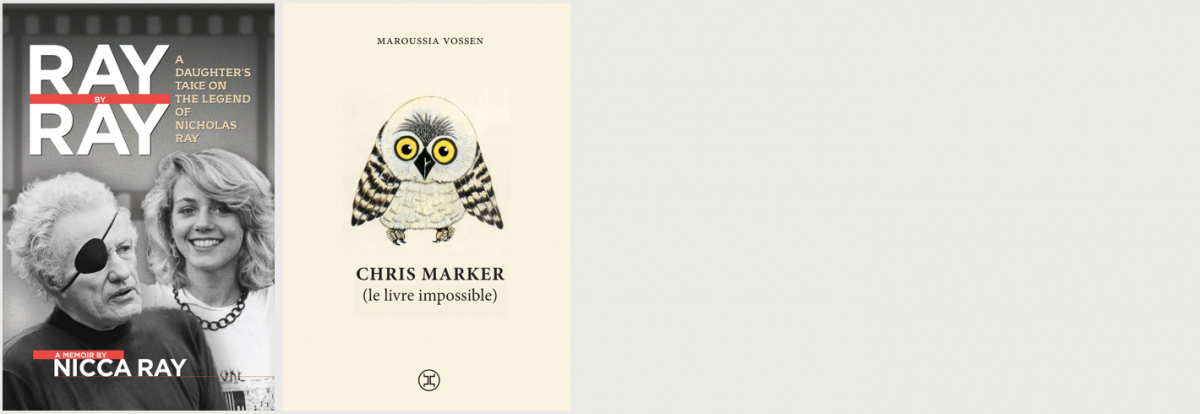
A Daughter’s Take on the Legend of Nicholas Ray is the subtitle of the culmination of Nicca Ray’s decades-long research on her father who died when she was 17. Through his movies and letters, and intimate interviews with family members and people who have known and worked with him, Nicca explores her father’s complex life and artistic legacy as well as their own complicated relationship and his impact on her life. Published last April, Ray by Ray is both a well-researched and a deeply personal mix of memoir and biography. You can order the book on the website of publisher Three Rooms Press.
Another daughter-father account – Maroussia Vossen’s memoir Chris Marker (Le livre impossible) – has been translated in English this past June by Andrew Castillo, film program assistant at Columbia University. Vossen, a dancer and choreographer, is Marker's adopted daughter. Originally published in 2016 by Éditions Le Tripode, this slim edition offers an unprecedentedly intimate look at the relationship the two shared from her birth to his death. Castillo shared this labour of love / quarantine project as a PDF on his website.
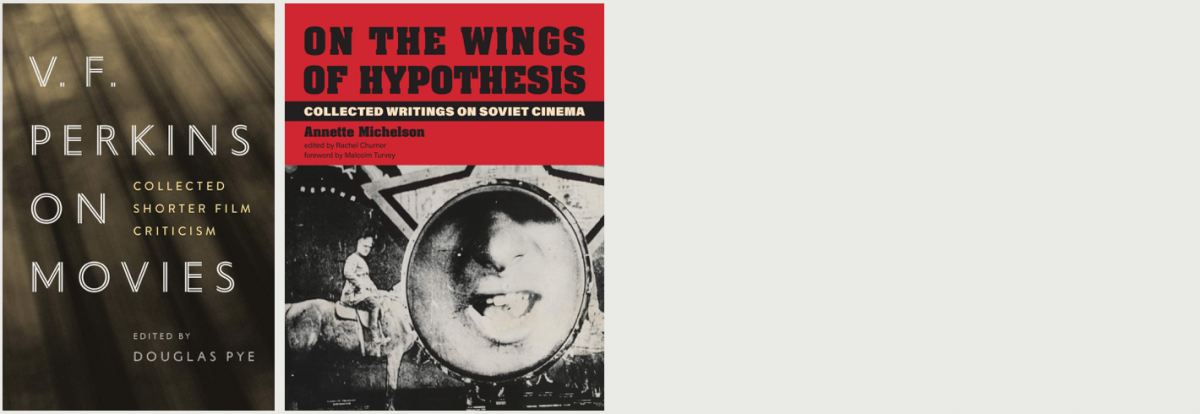
A third and final daughter-father project also brings us to a cluster of new colllections of film criticism. Polly Perkins who manages the literary estate of her late father, the critic and legendary teacher Victor Perkins, has found in Doug Pye the right friend and collaborator to edit the first book to be published from this estate, V. F. Perkins on Movies: Collected Shorter Film Criticism. Perkins is best known for his 1972 book Film as Film, but this new volume gathers his extensive writing in journals and edited collections, spanning sixty years yet less well known, because much of it was published in small magazines with limited distribution. The first part of the book covers Perkins’s early articles from 1960 to 1972, showing the emergence of ways of thinking about criticism and movies that remained constant throughout his career. Perkins was one of a small group of British writers who pioneered the serious and systematic discussion of Hollywood cinema. Beginning at the University of Oxford in the pages of Oxford Opinion, and then in Movie, the journal they established in 1962, these writers mounted a sustained critique of established writing on film, arguing for a criticism rooted in the detailed decisions that make up the complex texture of a film. The work Perkins published in the 1980s and beyond, which makes up the second part of this volume, was resolute in upholding his critical values. It elaborated his approach in studies of individual movies and their makers and also reflected on major critical and conceptual issues, while maintaining his lifelong commitment to writing accessibly in ordinary language. Forthcoming in November, the book can be pre-ordered on the website of publisher Wayne State University Press.
Another collection that, together with the one of Perkins, we just as well would have loved to put on the top of this note is On the Wings of Hypothesis: Collected Writings on Soviet Cinema. This posthumous volume gathers for the first time Annette Michelson’s erudite and incisive readings of the revolutionary films of Sergei Eisenstein and Dziga Vertov. Michelson introduced American audiences to Soviet cinema in the early 1970s, extending the interpretive paradigm she had used for American filmmakers of the mid-twentieth century – in which she emphasized phenomenological readings of their work – to films and writings by Eisenstein and Vertov. Over four decades, Michelson returned again and again to what she calls, following Eisenstein, “intellectual cinema” – the deliberate attempt to create philosophically informed analogues for consciousness. The volume includes Michelson’s major essays on Eisenstein’s unrealized attempts to make movies of both Marx’s Capital and Joyce’s Ulysses, as well as her authoritative discussion of Vertov's 1929 masterpiece The Man with a Movie Camera. This collection makes these canonical texts available for a new generation. Forthcoming in October, the book can be pre-ordered on the website of the publisher, The MIT Press.
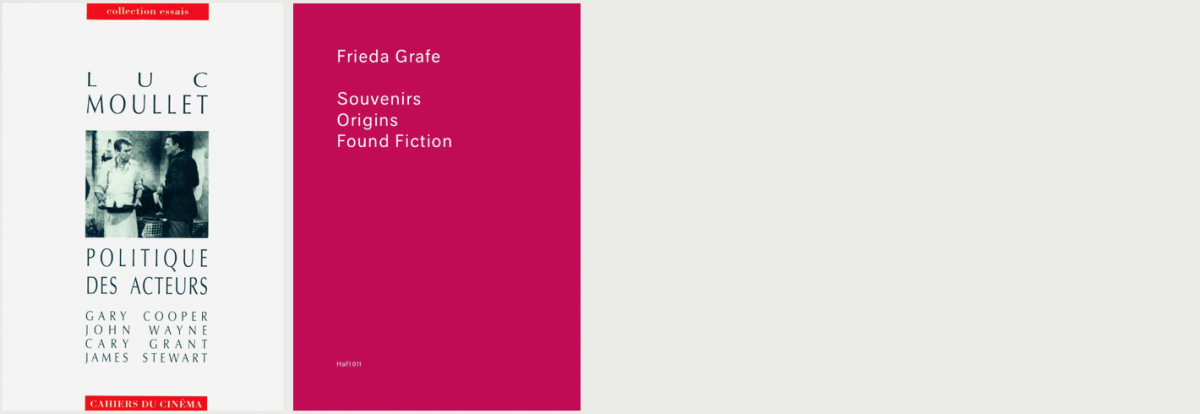
Having translated Luc Moullet’s entire review collection Piges Choisies last year, Bangalore based critic Srikanth Srinivasan has now almost finished with the English translation of another collection by the French critic and filmmaker, Politique des acteurs. Originally published in 1993 by Cahiers du Cinéma, this volume gathers Moullet’s extraordinary essays on four Hollywood actors: Gary Cooper, John Wayne, Cary Grant, and James Stewart. The project took off in April and only the chapter on the latter remains to appear online. You can read an follow the translation on the website The Seventh Art.
Last April, The Harun Farocki Institut put out a bilingual German-English booklet with three texts written by the outstanding film critic and translator Frieda Grafe. English translations of her work being very rare, Frieda Grafe: Souvenirs, Origins, Found Fiction provides a glimpse into her cosmos of film thinking, which has always emerged in close contact to its subject. The publication includes “Souvenirs, in Celebration of Cinema”, written at the occasion of the 100th anniversary of cinema, her review of Ingemo Engström’s film Kampf um ein Kind (1975), and “Found Fiction: Better Documentaries”, a piece with her reflections on the essay film. The book is complemented by a speech that Harun Farocki gave when Grafe, together with former head of the Munich Film Museum Enno Patalas, received an award. Farocki writes: “In Frieda Grafe's texts, we experience how she reads a film neither symptomatically, which would be a kind of film sociology, nor does she judge a film as a property title, as an announced or declined investment, which would be common, courtly film gossip. In her texts, the film appears as it is and she does not set it apart from what is otherwise common as I am now doing with her writing.” You can order the booklet for only 6 euros on the website of Motto Books. At the beginning of this year, Sabzian compiled a dossier on Frieda Grafe with Dutch translations of 12 of her texts and an article on her work by Gerard-Jan Claes.
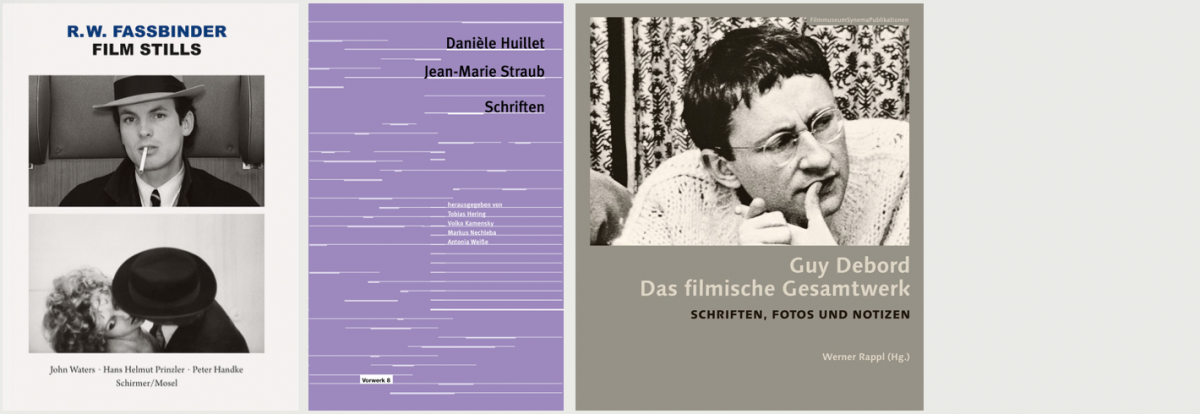
Why not continue with a wave of notable German-language books? Published on the occasion of what would have been Rainer Werner Fassbinder’s 75th birthday (May 21), the bilingual R. W. Fassbinder – Film Stills 1966-1982 is a visual distillate of Fassbinder’s art by way of 190 key film stills, and a tribute to the filmmaker, his actors and cameramen. In addition to the photographs, this volume contains three texts that were specially written for the book: novelist Peter Handke recalls a nightly encounter with RWF on the beach in Cannes, scholar and former Deutsche Kinemathek director Hans Helmut Prinzler delivers a film historical essay, and filmmaker John Waters brings a brilliant birthday serenade, “HAAAPPPYYY, HAAAAPPPPYYYY BIIIRRRRRTTTTHHHDAAAYYY, BAAABBBYYY!”. You can find more information on the website of the publisher Schirmer/Mosel Verlag.
All the texts that filmmakers Danièle Huillet and Jean-Marie Straub conceived and wrote as publications are now brought together in German for the first time in the latest volume of the book series ‘Texte zum Dokumentarfilm’ by the dfi-Dokumentarfilminitiative. In addition to the numerous texts originally published in German, Danièle Huillet / Jean-Marie Straub: Schriften now also contains a number of texts in German translation that were previously only accessible in Italian or French. Published in early June, this chronologically ordered collection begins with a report by Jean-Marie Straub from the Venice Film Festival in September 1954 and ends with a message from Danièle Huillet and Jean-Marie Straub to the same festival in September 2006, when they were given a Special Lion “that comes too soon for our death – too late for our life.” You can find an overview of some of the included texts here, and order the publication on the website of pubisher Verlag Vorwerk 8.
Also gathered in a single volume in German for the first time, Guy Debord: Das filmische Gesamtwerk unites the texts of all of Debord’s films in a new translation. Texts and images are true to the French original edition, but here complemented by a list of sources for the quotes, Debord’s notes on his films, drafts of unrealized film projects, as well as the text of the TV documentary he coauthored, Guy Debord, son art et son temps (1994). Two in-depth essays on Debord's film works by Alexander Horwath and Werner Rappl also complement this collection that is published in two tomes: Schriften, Fotos und Notizen (Scripts, Stills and Notes), and Kommentare, Quellen und Verweise (Comments, Sources and References). Originally planned in early April, the book presentation with Horwath and Rappl had to be postponed due to corona measures, but you can order the book and find the table of contents on the website of the Austrian Film Museum.
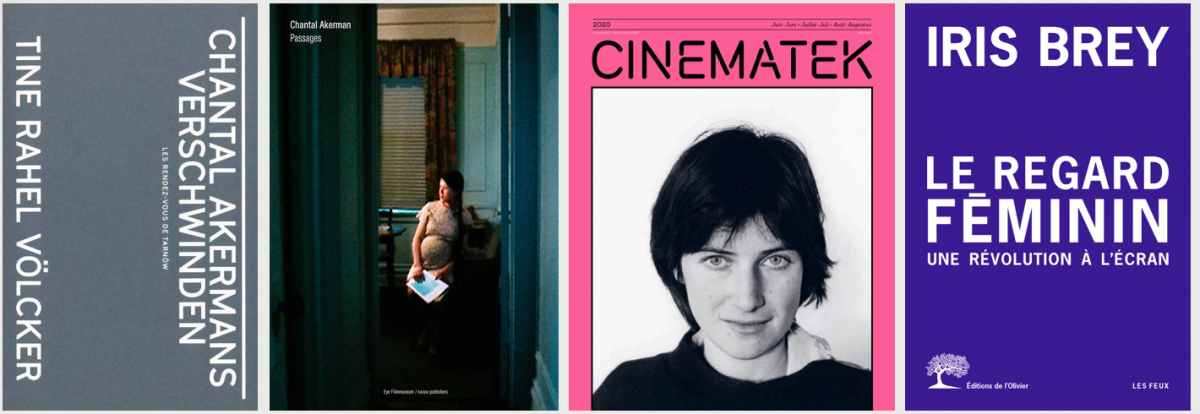
In Chantal Akermans Verschwinden: Les Rendez-vous de Tarnów, Berlin-based playwright Tine Rahel Völcker took six of Akerman’s films with her on a journey to Tarnów, a picturesque town in the south-eastern part of Poland. In the last election there, over 60 per cent of the population voted for right-wing or far-right parties. From 1942 to 1943 the entire Jewish population, half the town, was murdered by the German occupying forces. Chantal Akerman’s mother was born there in 1928. The book follows the traces of what is gone, eradicated, rendered invisible. Published last May, this work is available to order on the website of the publisher Spector Books.
Coinciding with Chantal Akerman’s 70th birthday on June 6, two other Akerman publications have been released by the Dutch and Belgian filmmuseum, respectively. Accompanying the solo exhibition of Akerman's video installations, Chantal Akerman: Passages is a richly illustrated, English-language publication with texts by Akerman herself, supplemented with essays by Cyril Béghin, Dana Linssen and Roos van der Lint. Cyril Béghin introduces the oeuvre and describes the historical tensions in the work. Dana Linssen’s contribution consists of a philosophical essay about the concept of time in Akerman’s work, while Roos van der Lint zooms in on the spatial installations. You can flip through the catalogue here, and order it in the webshop of the Eye Filmmuseum.
In a special summer edition of their program magazine, CINEMATEK (Brussels) compiled a tribute to Akerman. Film historians Anke Brouwers and Muriel Andrin have written a text specially for this publication (in Dutch and French, respectively). Andrin tells a three-act story of her personal history with Akerman's films, while Brouwers focuses on La Captive (2000) to highlight what characterizes her oeuvre.
Featuring a chapter on Chantal Akerman’s Je, tu, il, elle (1976), Le regard féminin: une révolution à l’écran is the first book-length effort to systematically define the female gaze with examples ranging from Alice Guy's early 20th century work to Paul Verhoeven’s Elle (2016), Mektoub My Love (2017/2019) (the devilish antithesis here), Wonder Woman (2017), Portrait de la jeune fille en feu (2019) or contemporary tv series. Iris Brey, a critic for Marie Claire and Les Inrockuptibles and a popular academic in France, has written an accessible book aimed at a wide audience. Published this past February, this well-selling book also got considerable media coverage in France, but was also received with some scepticism outside of France because of certain gaps or exclusions. In her generally favorable review, Erika Balsom pinpoints some of the book’s problems. You can find more information on the website of publisher Éditions de l’Olivier. Here, you can find the table of contents, read the introduction and a part of the first chapter.
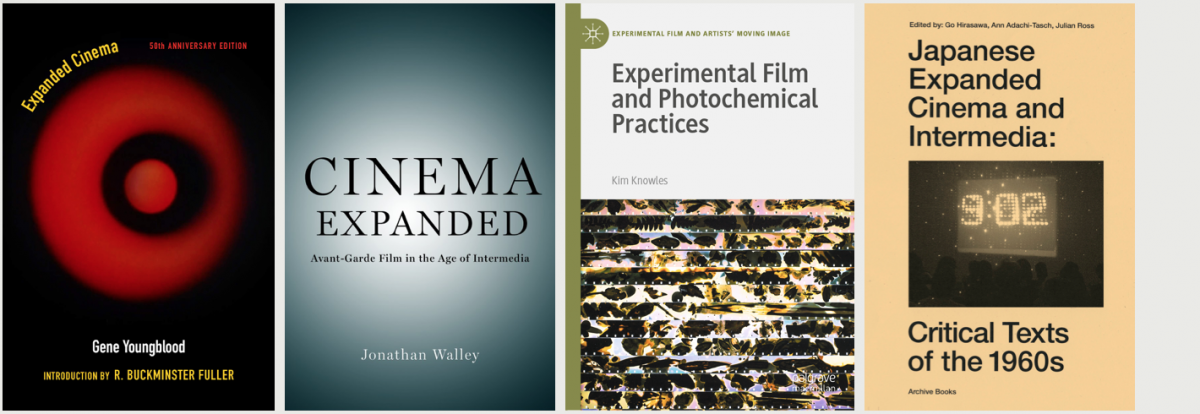
In the wake of the 50th anniversary reissue of Gene Youngblood’s landmark Expanded Cinema, a cluster of other expanded cinema publications has been released. First published in 1970 and re-released last March after decades out of print, Youngblood’s influential work remains an unique eyewitness account of the burgeoning experimental film and the birth of video art in the late 1960s, exploring how cinema as an art form might exist outside of cinemas. The anniversary reissue includes a new Introduction by the author that offers conceptual tools for understanding the sociocultural and sociopolitical realities of our present world. Nick Pinkerton reviewed the new edition for Film Comment, and Light Industry’s founder and director, Thomas Beard, for Artforum. You can find the table of contents and order the book on the website of publisher Fordham Univerity Press.
Published July 1, Cinema Expanded: Avant-Garde Film in the Age of Intermedia is both a historization and update of the ‘genre’. Author Jonathan Walley considers how the formal concerns of 1960s expanded cinema, such as the shift away from standard approaches to projection and screen surface, have evolved in the late-20th and early-21st century among a new generation of artists, including Sandra Gibson & Luis Recoder or Bruce McClure, to name only a few. Walley, argues that expanded cinema's apparent departure from the traditions and forms of cinema as we know it actually radically asserts cinema's nature and artistic autonomy. He also resituates expanded cinema within the context of avant-garde film history, linking it to a mode of filmmaking that has historically investigated and challenged the nature and limits of cinematic form. You can listen to Walley discussing his work with fellow scholar Erika Balsom on Light Industry's website. You can find the table of contents and order the book on the website of pubisher Oxford University Press.
Also including a chapter on expanded cinema, Experimental Film and Photochemical Practices sketches out the contours of a photochemical renaissance driven by collective passion, creative resistance and artistic reinvention. Celluloid processes continue to play a key role in the evolution of experimental film aesthetics and in this book, Kim Knowles takes a personal journey into the work of several key contemporary film artists. Forthcoming on October 6, you can pre-order the publication on the website of publisher Palgrave Macmillan.
Japanese Expanded Cinema and Intermedia: Critical Texts of the 1960s is aimed at English-language readers with a serious interest in Japanese film experiments of the 1960s. Edited by programmer and curator Julian Ross, Go Hirasawa, and Ann Adachi-Tasch, the book is intended to make important texts more widely available and make this field more accessible to interested audiences. This publication is part of a larger research project on Japanese expanded cinema for which they've conducted numerous interviews, archival research, film collection surveys, digitization of films, and commissioned new essays and translations of a selection of key texts that they felt were instrumental in shaping the specific discourse around these terms. On the website of the Berlin publisher Archive Books, you should be able to read the full version of the introductory essays by Julian Ross and Go Hirasawa, and purchase the publication since mid-June, but their website is currently down. In the meantime, you can find an excerpt of Ross’s essay and more information on the website of research and publication partner Collaborative Cataloging Japan.
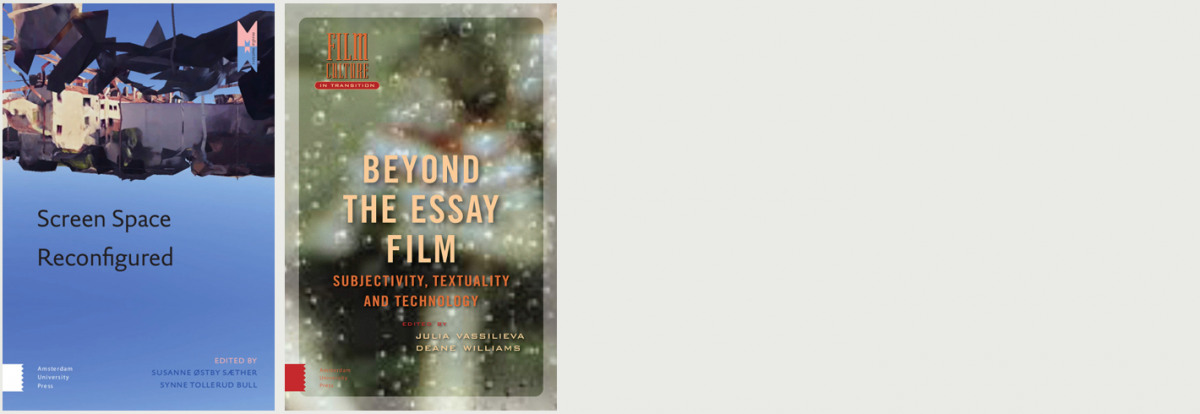
Slightly related, Screen Space Reconfigured is the first edited volume that critically and theoretically examines the many novel and resurfacing configurations of space as they appear across 21st century screens. Spanning contemporary mainstream cinema, experimental film, video art, mobile screens, and everyday screen practices, this open access volume includes contributions from such acclaimed authors as Tom Gunning. Published mid-June, you can read the book for free on the website of publisher Amersterdam University Press.
Another anthology from the same publisher, Beyond the Essay Film: Subjectivity, Textuality and Technology seeks to historicize the production of and reflection on the essay film and to speculate on the possible future of the format in the 21st, digital century. Adrian Martin provided for this book the first English translation of Raymond Bellour’s fascinating “35 years later” reflection on his 1975 piece “The Unattainable Text.” Bellour’s classic also serves as a point of departure for Adrian Martin and Cristina Álvarez López's own chapter in this volume. Published on July 6, the book includes contributions by Thomas Elsaesser, Catherine Grant and Richard Misek, among others. You can find the complete table of contents, read the introduction, and order the book on the website of Amsterdam University Press.
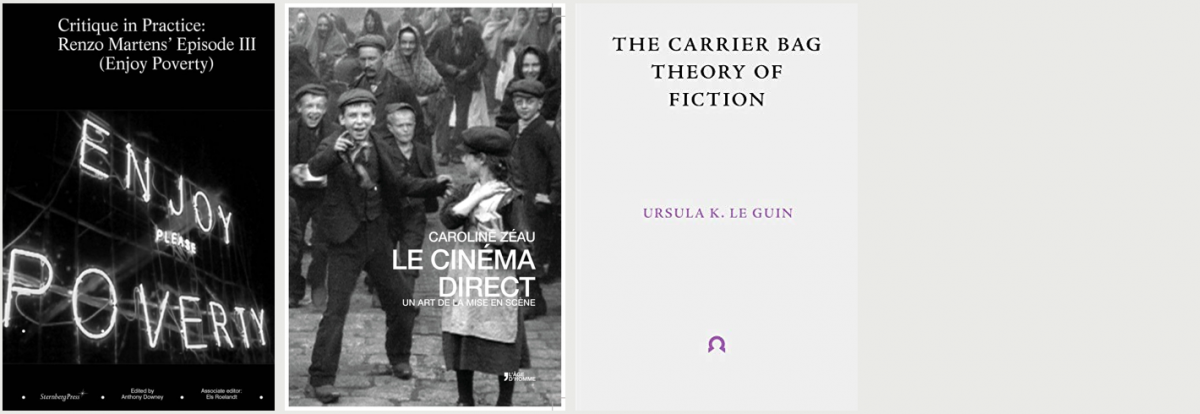
Another new anthology with an impressive line-up of contributors is Critique in Practice – Renzo Martens’ Episode III: Enjoy Poverty. The eponymous 2008 film has generated far-from-resolved disputes and remains a landmark intervention into debates about contemporary art’s relationship to exploitative economies. More than a decade after the release of Episode III: Enjoy Poverty, this volume explores the work’s legacy and how it relates to the politics of representation, uses of the documentary form, art criticism, the deployment of humanitarian aid, the impact of extractive forms of globalization, and the neoliberal politics of decolonization. Contributors include Frank Vande Veire, Pieter Van Bogaert, Eyal Weizman, Matthias De Groof, Els Roelandt, T. J. Demos, Ariella Azoulay, Nikolaus Perneczky, and many more. The publication date has been postponed to April, and you can now find the table of contents and order the book on the website of publisher Sternberg Press.
Although Martens' film of course operates in totally different mode, Le cinéma direct: un art de la mise en scène deals with some related questions about the documentary form or truth claims. In the book, direct cinema specialist Caroline Zéau explores what this term can mean (a form, a style, a documentary subcategory, an obsolete filmic utopia?). She thereby focuses on the thorny aspect of mise en scène or its hypothetical abscence. Zéau argues that direct cinema constitutes a matrix – now more pertinent than ever – for contemporary documentary cinema. Published on July 24, the book can be ordered on the website of publisher L'âge d'homme; the back cover description can be downloaded here.
On the flip side, Ursula K. Le Guin's influential 1986 essay The Carrier Bag Theory of Fiction has been republished earlier this year with a new introduction by the social theorist Donna Haraway, who has been deeply influenced by her writings. American author Le Guin (1929-2018) draws on the idea that the earliest human invention wasn't the spear or other weaponry, but the carrier bag or a container that held items that had been gathered. At the same time a method for storytelling and history, the carrier bag story implicates an ideological shift away from a linear founding myth driven by conflicts and male heroes to a possibly shuffled or disarranged narrative of gathering, holding, and sharing. You can order this tiny booklet on the website of the young, London-based publishing house Ignota.
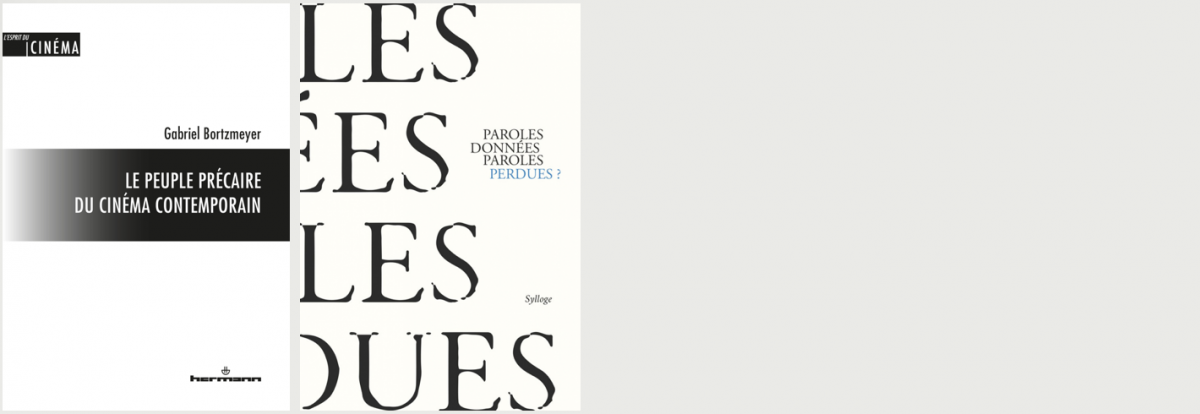
Sharing a fascination for “l'homme du commun” (Caroline Zéau) and cinema as “the art of the people”, Le peuple précaire du cinéma contemporain explores the figure of a precarious people in cinema as seen across some very distant stages: the films of Jia Zhangke, a contemporary French cinema (Abdellatif Kechiche, Bruno Dumont, ...), documentaries made in insurgent places (Sylvain George, Sergei Loznitsa, ...) and others shot with migrants. The assembly of these “gaps” brings out shared features drawing the silhouette of a precariat, more indeterminate and less substantial than the proletariat of which it is the successor. The author, Gabriel Bortzmeyer, is part of the editorial board of film magazine Débordements. The book is out since last May. You can find more information on the website of publisher Hermann and download the foreword and table of contents here.
In Brussels, monthly reunions (called “espaces de paroles”) bring together homeless and precarious people to talk since many years. With the agreement of the participants, the association La Strada (now Bruss’help) has filmed 70 of these meetings over the course of several years. Together, these recordings constitute an archive of private or semi-public words, of voices rarely heard, registered, let alone preserved. Departing from this audiovisual material, Paroles données, paroles perdues ?is a “mise en forme” of a selection of these conversations, presented as a compilation of fragments, inspired by the form of a glossary. This work (as well as the illustrations and design) has been done by the collective Sylloge, made up of filmmaker Margaux Dauby, sociologist Lucie Martin and archivist Emanuel Lorrain. Published on June 8 by Éditions Maelström ReEvolution, Paroles données, paroles perdues? is available to order on its own website where you can also leave through parts of the book.
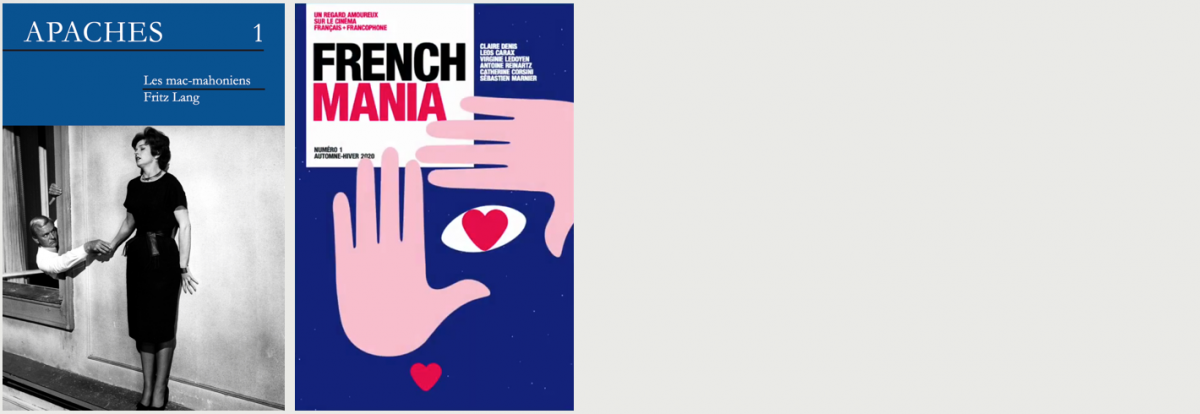
It's a small miracle that, just as in our last book note, we can again conclude with some newly founded, independant film magazines, in print or online – consider supporting them. First off, founded in June last year as an online film magazine, Apaches has now released its first issue in print focusing on the Mac-Mahonians and one of their four aces (“carré d'as”), Fritz Lang. It also includes a long interview with Michel Mourlet, who in 1959 wrote the Mac-Mahonian manifesto “Sur un art ignoré”. Thanks to crowdfunding a second issue is secured. The association behind the magazine is Les Contrebandiers de Moonfleet, which unites a group of young cinephiles based in Rennes, some of them affiliated with the cinema department of the university there. You can order the magazine on the website of Apaches, read the editorial and check the table of contents here.
After three years of online existence, another French film magazine, FrenchMania, launches its first print issue. Exclusively dedicated to French and Francophone cinema, FrenchMania is designed as a 180-page “mook” (magazine + book), free of advertisements, and scheduled to appear twice a year in a Fall-Winter and Spring-Summer edition. The inaugural issue includes talks with actress Virginie Ledoyen, Rosalie Varda (about the archives of her mother), and a dossier on Leos Carax and Claire Denis from the perspective of a younger generation of French filmmakers. As of September 2, the magazine will be available to purchase in book shops in France, but on their website you can already pre-order to receive it earlier at a reduced price or pre-subscribe (to support the realization of the second issue).

Conceived near the beginning of the coronavirus lockdown, the new online film magazine Cinema Year Zero published its first issue mid-June. They will periodically present volumes (as they call them) of essays on a different theme, starting with Volume 1: Apocalypse. Their passionate mission statement finds inspiration in how COVID-19 turned notions of the “contemporary” in cinema on their head. “Suddenly that which was ‘overlooked’ as the industry ploughed ahead might come to the fore. (...) The hierarchy of criticism has flipped. The cultural capital of seeing a film a few months, weeks or days before everyone else via the usual cinema rollout has gone.” Under the tagline “Slow criticism from the end of the world”, they want to create a space “without deference to hot takes or any of the other bile that comes from the constant review cycle.” Edited by London-based critics Tom Atkinson and Ben Flanagan, Cinema Year Zero can best be read via the website’s table of contents, including articles about the remnants of what was formally known as “the movie theater”, or about the bourgeois leanings and romantic myth of film festival culture. You can buy them a coffee on Ko-fi to make it possible to pay the six contributors of the next issue.
A similar sound can be heard at the recently revamped platform Ubiquarian, an independant website dedicated to experimental, documentary and short films that “wants to do something simple: discuss the movies we were surprised by. We champion the voices that get drowned out, the formats that don’t fit into the corporate entertainment matrix.” Founded by Belgrade-born and Vienna-based critic Marina D. Richter many years ago, the website has now been rethought and has considerably expanded its team by attacting new experienced writers, e.g. Tara Judah and Pamela Biénzobas Saffie. They stress the importance of every contribution or commission being paid, while the critics are still free to cover what they want in the tone of writing they want.
On May 7, Zoom Out has been launched: a new film platform (EN/FR) from Montréal, conceived as an extension of its sister sites Hors Champ and Offscreen. It aims to “nurture the confluence of artistic and critical practice in the shape of new forms of film criticism: audio-visual essays, podcasts, sound projects, cine-concerts, interviews, etc.” Supporting its launch, Cristina Álvarez López and Adrian Martin have contributed a new audiovisual essay based on Vilém Flusser’s essay “Shelters, Screens and Tents”. Zoom Out is a lot of things; follow them on one of their social media channels or the newsletter to not miss a thing, or you can explore their website by filtering on a media category or on one of their seven series currently running, such as the One + One combinations or the often brilliant film excerpt of the week.
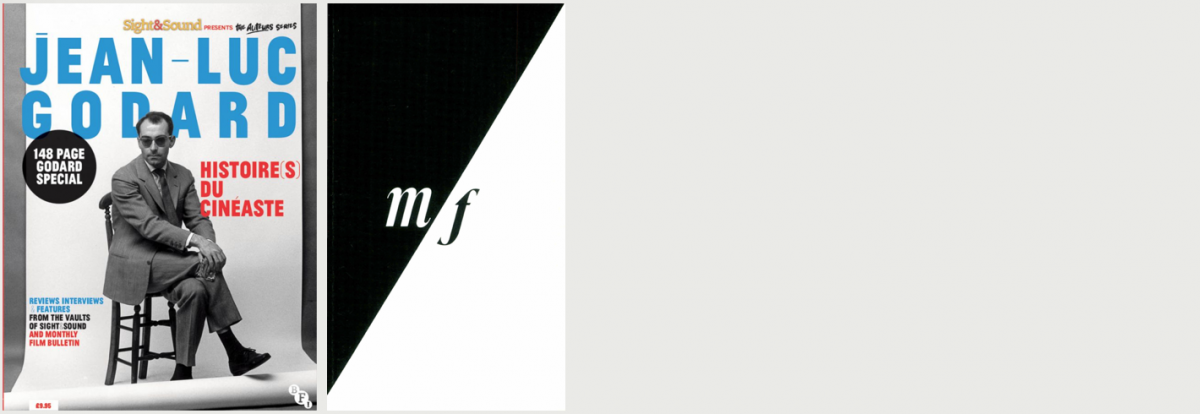
The British film magazine Sight & Sound published its first ever standalone special presenting 60 years of their coverage of Jean-Luc Godard, from their reviews of his first shorts and New Wave interviews to their critics’ 21st century reassessments of his work. It's the first of a new series “celebrating the work of the greatest auteur directors in history” by way of delving into the Sight & Sound and Monthly Film Bulletin archives. On the website of the BFI Shop, you can find the full table of contents and order this 148-page Godard special that is shipping since the beginning of July.
Another archival project of a London journal is the new website that’s offering free access to all the texts of M/F, a legendary feminist publication that was self-published with ten issues appearing between 1978 and 1986. The platform is online since the end of April and has an index on author and issue. There, you can also read a text on “The Legacy of m/f” by political theorist and philosopher Chantal Mouffe.

